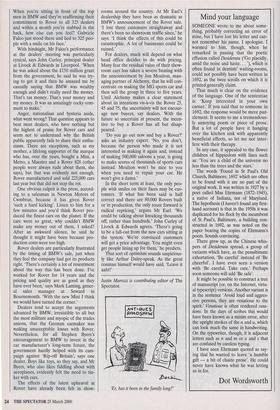Mind your language
SOMEONE wrote to me about some- thing, probably correcting an error of mine, but I have lost his letter and can- not remember his name. I apologise. I warmed to him, though, when he remarked in passing that the poetic effusion called Desiderata (`Go placidly, amid the noise and haste. . . '), which is often found in dentists' waiting-rooms, could not possibly have been written in 1692, as the twee scrolls on which it is printed generally claim.
That much is clear on the evidence of the language. One of the sententiae is: 'Keep interested in your own career.' If you said that to someone in 1692, the response would be mere puz- zlement. It seems to me a tremendous- ly annoying poem or piece of prose. But a lot of people have it hanging over the kitchen sink with apparently beneficial effects, so let me not inter- fere with their therapy.
In any case, it appealed to the flower children of hippiedom with lines such as: 'You are a child of the universe no less than the trees and the stars.'
The words 'Found in St Paul's Old Church, Baltimore, 1692' which are often to be found with it are no part of the original work. It was written in 1927 by a poet called Max Ehrmann (1872-1945), a native of Indiana, not of Maryland. The hypothesis (I haven't found any first- hand account) is that in the 1950s it was duplicated for his flock by the incumbent of St Paul's, Baltimore, a building con- structed in 1692, as was noted on the paper bearing the copies of Ehrmann's poem. Sounds convincing.
There grew up, as the Chinese whis- pers of Desiderata spread, a group of variants which have, as the penultimate exhortation, 'Be careful' instead of 'Be cheerful'. I have even seen a version with 'Be careful. Take care.' Perhaps soon someone will add 'Be safe'.
It might be possible to construct a tree of manuscript (or, on the Internet, virtu- al typescript) versions. Another variant is in the sentence 'Avoid loud and aggres- sive persons, they are vexatious to the spirit.' Vexatious is often rendered vexa- tions. In the days of scribes this would have been known as a minim error, after the upright strokes of the n and u, which can look much the same in handwriting. On the typewriter, though, it is adjacent letters such as n and m or a and s that are confused by careless typing.
I have seen Ehrmann quoted as say- ing that he wanted to leave 'a humble gift — a bit of chaste prose'. He could never have known what he was letting us in for.
Dot Wordsworth


































































 Previous page
Previous page